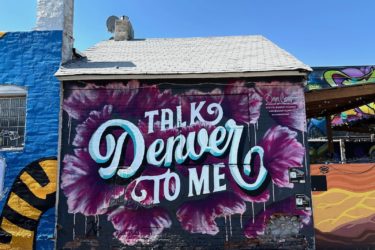The Local newsletter is your free, daily guide to life in Colorado. For locals, by locals.
Editor’s Note: Welcome to the final part of our exclusive four-part online series about Colorado filmmakers at the Oscars. Be sure to tune in to the big show on February 24.
A still photographer from Boulder, Louie Psihoyos began his career with National Geographic before snagging a job at Fortune Magazine, where he befriended Jim Clark, founder of Netscape, Silicon Graphics, and WebMD. The two established the Oceanic Preservation Society and began a lifelong mission to save the ocean. Their first task: Stop the mistreatment of dolphins off the coast of Japan. With all the thrills and intrigue of a real-life caper, Psihoyos and his team penetrated the security surrounding Japan’s Taiji village and covertly recorded the mass slaughter of dolphins in the heartbreaking and influential documentary The Cove. The film won the Academy Award for Best Documentary (Feature) in 2010.

5280: How did the Oceanic Preservation Society come about?
Louie Psihoyos: Jim Clark and I were friends and dive buddies, traveling around the world for about 13 or 14 years. Sadly, every time we returned to dive sites, there’d be less fish and the reefs would be destroyed due to dynamite fishing, bleaching, etc. On our third trip to the Galapagos, we saw people illegally fishing in a marine sanctuary. Jim said, “Somebody should do something about this!” I responded, “How about you and I?” So we started the Oceanic Preservation Society with the idea that we would fund movies and take pictures to inspire people to save the ocean.
Shortly after, I went to a marine animal conference and bumped into Ric O’Barry. He was supposed to talk at the conference, but they wouldn’t let him because he was going to talk about the killing of dolphins. I was stunned because I couldn’t imagine anyone killing a dolphin. That’s when the story behind The Cove began.
5280: Has it been challenging convincing people to watch the film?
LP: Yes. The biggest challenge has been getting people to break through their initial reservations. The Cove isn’t about seeing animals getting killed. It’s fun. It’s exciting. It’s a thriller. But yet, there’s that one sequence in there. Even now when I talk to people, they tell me, “Oh, I can’t see that movie. It’s about dolphins getting slaughtered.”
5280: If you had the chance to redo The Cove, would you do anything differently?
LP: I have no qualms about what we did, and I wouldn’t cut out a single frame. There’s a reason for the movie and, unfortunately, it’s also the one that keeps people away in droves. I didn’t set out to make a horror movie. (I hate horror films). I wanted to use the elements of what made a great horror film—like the shower scene in Psycho. You never see the perpetrator and the victim in the same shot. It’s all music and suspense. And we did a lot of that in The Cove. A lot of the imagery you see is surrealistic. You never see a harpoon go right into a dolphin; you see aspects of it. Your imagination becomes more powerful than what you witness in the film. And we almost did too good of a job of that.
But if people look at it openly, they’re surprised at how beautiful it is, how exquisite, how exciting, and how incredible it is. And the film carries an important social message, beyond the killing of dolphins. To me, The Cove is a metaphor or a microcosm for what we’re doing to the ocean.
5280: Tell me about a memorable Oscar moment.
LP: George Clooney told me The Cove was better than Ocean’s Eleven because it was real. It was as good as any Hollywood blockbuster, maybe even better because it has all the elements of a thriller, a caper, and a heist film.
5280: So, what’s changed in Taiji since the film came out?
LP: They have more than 100 policemen today when they used to have four. And they have a whole posse of observers from around the world watching them and reporting back.
Dolphin meat, because of what we throw into the ocean, has between five to 5,000 times more mercury than what is allowed by Japanese law. Imagine if our lettuce or cabbage or broccoli in America was that toxic. I would hope somebody would tell us we’re eating poison. Recently, the Japanese mayor said that we’ve cut down their demand for dolphin meat by a half. When you cut down the demand by half for anything, it’s a severe blow to that economy. We’re far from finished, but we fully expect to win this battle in time.
5280: What can you tell me about your next project, The Singing Planet?
LP: That’s just the working title. To me, it sounds a little too Disney. It’s really a film about species extinction caused by mankind. Christopher Clark is the guy who discovered that humpback whales are singing. He runs the bioacoustical laboratory at Cornell and told me that just about everything in the world is singing. We just haven’t been listening.
In the history of the planet, we’ve gone through five major extinctions. The last one killed about 70 percent of all life on the planet, when a meteor hit. And we’re going through one that’s similar now, except that humanity is the asteroid and we’re losing species faster than our ability to record that they were here. Essentially, we’re wiping out all of the voices in the chorus.
5280: So, will this be your Ocean’s Twelve?
LP: Yes. It’s going to be bigger and better. The production values will be higher. And it’s going to be another thriller.
Next Up: The documentary The Singing Planet (TBD)
—Image courtesy of Viki Psihoyos
Part One: Sarah Siegel-Magness
Part Two: Derek Cianfrance
Part Three: Donna Dewey








